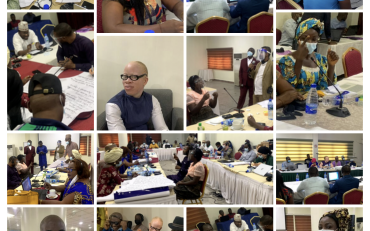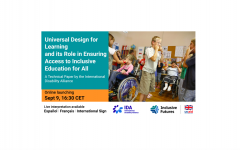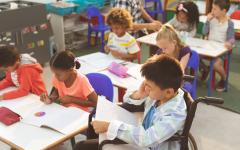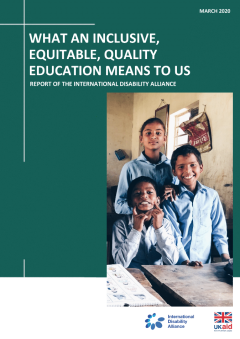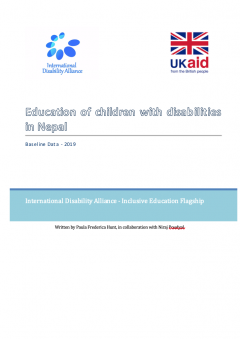From the 22 to 24 February, the Joint of National Association of Persons with Disabilities (JONAPWD), the West Africa Federation of the Disabled (WAFOD), the African Disability Forum (ADF) and IDA organized a three day training workshop on Inclusive Education for West African representatives of organizations of persons with disabilities (OPDs). The workshop brought together 26 participants and facilitators from ten African countries from different constituencies, including people affected by leprosy, Deaf people, persons with albinism and persons with psychosocial disabilities.
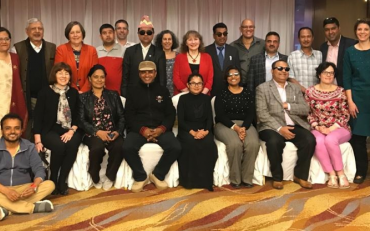
The Education Flagship Initiative is a component of a broader Disability Catalyst Programme (funded by DFID). The objective of the Flagship is to provide an evidence-based DPO perspective to frame the implementation of SDG 4 (Ensure inclusive and equitable quality education and promote lifelong learning opportunities for all) in compliance with CRPD Article 24.
Background
- According to UNICEF, 1/3 among out-of-school children are children with disabilities
- In the past few years, there has been a greater awareness at international level of the exclusion of children with disabilities from education, with increasing visibility in international organisation reports in the frame of monitoring of Education for All and now SDG 4
- Major initiatives to improve access to education such as the Global Partnership for Education (GPE) still provide limited attention to including children with disabilities
- At national level, there has been many initiatives led by NGOs and /or governments seeking to make education system more inclusive, albeit too often through pilot projects or local initiatives that are not scaled up or adoption of policies not yet implemented
Rationale
Explicit references to persons with disabilities in the SDGs provide opportunities to explore connections and mutual reinforcements between SDG 4 and CRPD Article 24. The adoption by the Committee on the Rights of Persons with Disabilities of the General Comment on the “right to inclusive education” has been a landmark providing clarity on interpretation of rights and states obligations under Article 24 of the CRPD.
Despite some progress in international frameworks and progress in the development of more adequate education laws and policies, there is no certainty that any country for that matter is on track to ensure access to quality inclusive education for all children with disabilities by 2030.
Overall, we observe a shift from the “access to education crisis” to the “learning crisis”. Today, in the global discourse among governments, the conversation is shifting as the perception is that most children (in general) are in school to what they actually learn at school. This is a situation we need to be careful about, because accountability might shift towards more emphasis on learning outcomes, which can create good incentives but can also be detrimental to inclusion and equity.
There is currently a lack of evidence on what works to achieve SDG 4 on inclusive quality education by 2030 for all children with disabilities, including policy scenarios that comply with the standards of the CRPD for all groups, and adjust to the cultural, social and economic realities of low and middle-income countries.
In a context of competing priorities and limited funding, it is essential that DPOs come up with clear messages and recommendations, building on the evidence of what works and looking at mechanisms for taking good practices to scale for broader impact.
The IDA Inclusive Education Flagship was therefore conceived as a way to create a space for IDA members to discuss, coordinate positions towards strategic, evidence-based advocacy in this sector. Led by a task team with representatives from IDA members IFHOH, II, IFSBH, WBU, WFD and IDA Secretariat, the IDA Inclusive Education Flagship
Objectives and targets of the IDA Inclusive Education Flagship
Objective: to develop a DPO-led, evidence-based consensus perspective on how to best achieve SDG 4 and CRPD Article 24 for all children with disabilities by 2030
Targets:
- Baseline (March 2017): The GPE has a part-time staff appointed on disability, with a full time fellow externally seconded; there is no reference to disability in the GPE 2011-2014 call for investment; little focus on inclusion in the 2012-2015 strategy; clearer focus on inclusion in the 2016-2020 strategy
- Target by March 2018: Specific resource allocation for inclusion of children with disabilities in GPE replenishment secured
- Target by March 2019: At least 2 prominent commitments (e.g. increased allocations, improved coordination, new commitments) on inclusive education are made by key stakeholders (e.g. global education stakeholders, donor agencies or national governments)
- Target by March 2020: A global report including evidence-based policy scenarios for at least 1 low- and middle-income country is produced by DPOs and shared with key education stakeholders to frame the implementation of SDG 4 in compliance with CRPD article 24
Activities
Key activities of the IDA Inclusive Education Flagship include:
- Stock-taking exercise and review of the situation of disability in the education sector
- Data collection on the education system and access of children with disabilities on at least one low- and middle-income country
- Experience sharing among IDA members and their members in the selected country
- Identification of commonly agreed parameters to guide the development of policy scenarios in order to achieve SDG 4 in compliance with the CRPD for all children with disabilities
- Framing of recommendations in a global report
- Where relevant and in line with progress on the development of a consensus position, influencing of prominent global education events or stakeholders, such as the GPE, key education messages of the Global Disability Summit, the Global Education Monitor report.
Related updates on IDA website:
